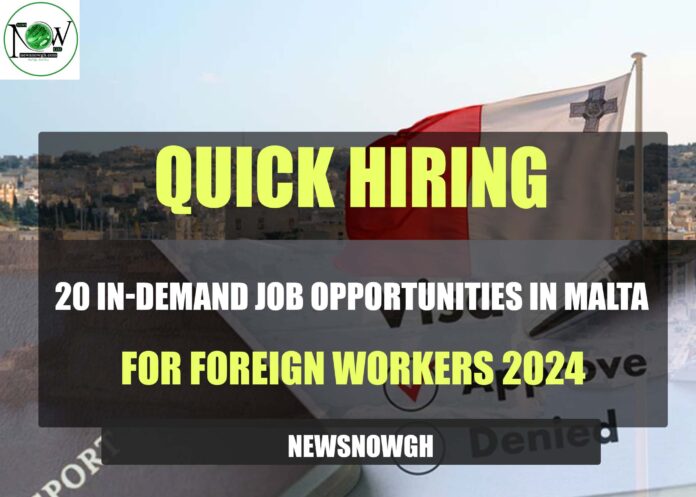20 In-Demand Job Opportunities in Malta for Foreign Workers 2024 | Quick Hiring
According to the 2023 EURES report on shortages and surpluses, the island nation of Malta is now experiencing a labor shortage in 20 vocations. This suggests that Maltese authorities are trying to draw in highly trained foreign workers. In light of this, the Maltese government’s Identita agency has chosen to introduce the Specialist Employee Initiative (SEI).
This implies that foreigners who want to live and work in Malta have a better chance of finding a job if they meet the requirements to work in any of these positions.
Manufacturing, construction, healthcare, food service, hospitality, business, administration, and transportation are a few of the industries facing a labor shortage. Furthermore, Malta, which is expected to have a population of 542,051 in 2022, is dependent on foreign labor to fill open positions in a variety of industries.
Skill Shortage Jobs in Malta 2024
The most recent EURES study states that there is a labor shortage in Malta for the following positions:
- Building construction laborers
- Manufacturing laborers
- Cleaners and helpers in offices, hotels, and other establishments
- Messengers, package deliverers, and luggage porters
- Car, taxi, and van drivers
- Health care assistants
- Security guards
- Shop sales assistants
- Child care workers
- Waiters
- Bartenders
- Contact center information clerks
- Accounting and bookkeeping clerks
- General office clerks
- Bookmakers, croupiers, and related gaming workers
- Administrative and executive secretaries
- Chefs
- Managing directors and chief executives
- Business services and administration managers not elsewhere classified
- Office supervisors
Malta Seeking to Draw in Highly Qualified Personnel
For highly qualified individuals from developing nations who are not eligible for the Key Employee Initiative but have the necessary academic or technical abilities for the job offer in Malta, the Specialist Employee Initiative (SEI) offers an alternative.
To be able to apply, these foreign nationals from non-EU nations must have signed a contract with a business that is registered in Malta. In addition to the Specialist Employee Initiative (SEI), international labor is regarded by the Malta Employer Association (MEA) as being essential to Malta’s logistics sector.
President Joanne Bondin emphasized the critical role that foreign workers play in sustaining and accelerating economic growth during a National Forum organized by MEA.
As stated by Bondin,
“People from the EU and beyond the EU have filled job vacancies in the logistics industry that could have otherwise impeded its growth. They increase the labor force, allowing businesses to satisfy the growing demand for their services.
However, to work in Malta, citizens of non-EU nations must get a visa. There are three different kinds of work permits available: the EU Blue Card, the Key Employment Initiative, and the Single Permit.


